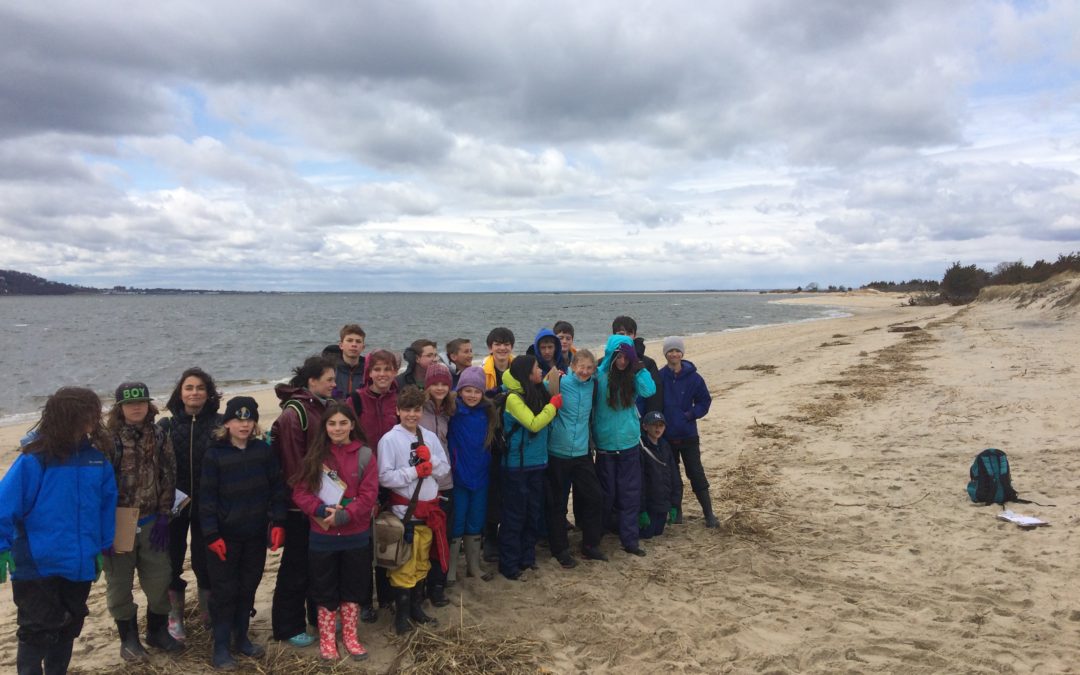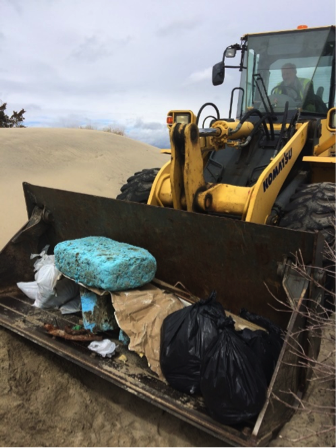Throughout this past winter, student scholars at Ridge and Valley Charter School explored ocean currents, climate, and plastic pollution. Students read, researched, and learned about plastic pollution, focusing on single-use plastic items which make their way into our ocean systems. They looked at the policies of a number of other states, as well as other countries, which impose single-use plastic bag bans at grocery stores, restaurants, and retail stores. The students also learned about the proposed bag tax in New Jersey. They then researched the topic of plastic bags and crafted argumentative essays detailing their positions on the issue of a plastic bag ban in New Jersey.
Ridge and Valley Charter School Service Learning Project with Clean Ocean Action
As part of this study, the school partnered with the Sandy Hook based organization Clean Ocean Action, a leading national and regional voice working to protect waterways along the NJ/NY coast using science, law, research, education, and citizen action. The student scientists traveled to Sandy Hook on Friday, April 7, 2017, to complete a service learning project on the beach. They participated in a “beach sweep” to collect and study debris and nonpoint-source polluted garbage brought to shore from coastal currents. According to the Environmental Protection Agency, “nonpoint source pollution is caused by rainfall or snowmelt moving over and through the ground. As the runoff moves, it picks up and carries away natural and human-made pollutants, finally depositing them into lakes, rivers, wetlands, coastal waters and ground waters.” Each piece of debris was identified and documented using data sheets provided by Clean Ocean Action to quantify the different types of pollution washing ashore. Clean Ocean Action creates annual reports detailing the data from clean-ups throughout the year which can be found on their website.
Real-World Experience Connected to Academic Studies
Braving high winds, cold temperatures, and rain, the 24 students collected nearly 200 pounds of debris. The majority of this debris consisted of single-use plastic pieces ranging from bottle caps to straws, including foam pieces of coffee cups. Students also noticed that exposed to the sun and elements, these usually rigid plastic pieces were brittle and, due to the plastic’s ability to photodegrade or break down into small pieces when exposed to sunlight over time, disintegrated into smaller pieces of micro-plastic which were difficult to collect. Studies by the World Economic Forum give estimates that plastic pollution in our oceans will outnumber fish by the year 2050.
This opportunity provided the students with real-world experience connected to their academic studies, a greater sense of purpose for their learning, and opportunities to build skills in math, science, collaboration, and communication while witnessing and experiencing an environmental threat.
A Student Essay Supporting a Ban on Single-Use Plastic Bags in New Jersey:
Every year, about one and a half trillion plastic bags are used, as stated by the Environmental Protection Agency. The goal of the EPA is to protect the “health of humans and the environment.” These plastic bags are all single-use, meaning they usually have a one-time use and then are thrown away. A few alternatives would be reusable shopping bags and bringing back your previous single-use plastic bags or paper bags. Banning single-use plastic bags in New Jersey will bring a positive outcome because plastic bags harm wildlife, are virtually indestructible, and manufacturing can damage our air and the environment. 
For instance, plastic bags can float around in the wind because they are so light, getting entangled in bushes, trees, or even animals. They can even be consumed by either land or water species. Others may say that the animals shouldn’t be eating the plastic because it is not their natural diet. However, turtles, especially, will mistake the plastic bags for jellyfish causing blockages in their digestive system. According to the center for Biological Diversity, which is helping to conserve the land and waters for all different species, “100,000 marine animals die annually from plastic bags.” It can take a tremendous amount of money to just clean up the plastic bags and other littered garbage in our waterways, costing $428 million a year for the state of California, according to the Natural Resources Defense Council whose mission is to allow everybody to clean air, water, and wild. This is important because it could take a significant toll on the animals of New Jersey, endangering their health and their environment. We need to help by cleaning up the plastic bags, in order to make a safe habitat for the animals and plants.
In addition, plastic is virtually indestructible because it photodegrades from the sun. According to the documentary Plastic Paradise by Angela Sun, a film about how plastic affects animals and plants health, but also her experience learning about where plastic is created from, “photodegrade” means the plastic breaks into smaller and smaller fragments of plastic when exposed to sunlight. This can be even more harmful to the animals because it can be easier for them to consume and digest and then pass its way up the food chain. It is easy to think that plastic, like almost everything else, biodegrades, but when you look at the facts, it shows that it never actually goes away. It is another great reason to ban single-use plastic bags in New Jersey because this plastic could eventually make its way into our bodies.
In fact, plastic bags are made from fossil fuels which are non-renewable. They also take large amounts of water and energy to manufacture and ship them. During the process, billions of pound of waste and millions of tons of CO2 are left each year in the United States. ReuseThisBag.com, has been around for ten years and makes bags that are reusable. They state that each minute, we use one million plastic bags. All of this adds up over time because these plastic bags all need to go somewhere. Critics of the plastic bag ban may argue that most people recycle their plastic bags, however, according to Plastic Paradise, only one out seven bags are recycled, whereas the others are thrown away, ending up in landfills or as litter.
All in all, we should particularly ban single-use plastic bags in New Jersey because plastic bags harm the wildlife, are virtually indestructible, and manufacturing can damage our air and environment. By banning single-use plastic bags in our state it will help the environment, save money by stopping the manufacturing of bags, and we will minimize plastic pollution in New Jersey. If we don’t start banning single-use plastic bags now, there will be an enormous amount of plastic bags in the future, particularly in our rivers and ocean, not just in our landfills. Together, we can help support this idea by reducing the amount of any kinds of single-use plastics and stick to reusable bags.
7th Grade Student
Ridge and Valley Charter School
1234 State Route 94
Blairstown, New Jersey 07825

